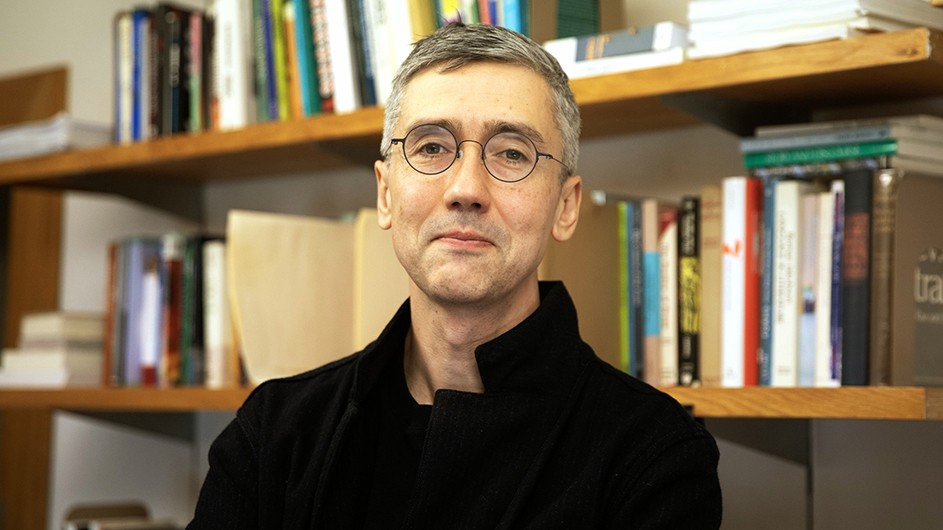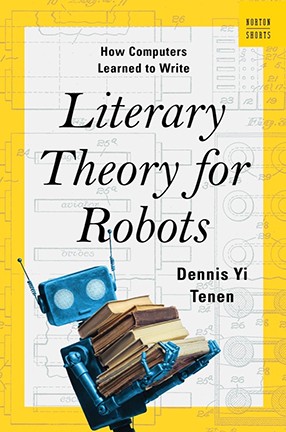Don’t Worry, AI Isn’t Taking Over the World
In his new book, Dennis Yi Tenen presents AI as a matter of collaborative labor history.

Literary Theory for Robots, the new book by Dennis Yi Tenen, an associate professor of English and Comparative Literature, explores the history of modern machine intelligence, taking readers on a journey that includes medieval Arabic philosophy, visions of a universal language, Hollywood fiction factories, and missile defense systems trained on Russian folktales. In his reflection on the shared pasts of literature and computer science, Tenen, a former Microsoft engineer, provides crucial context for recent developments in AI.
Tenen, whose research happens at the intersection of people, text, and technology, maintains that intelligence expressed through technology should not be mistaken for a magical genie, capable of self-directed thought or action. Rather, he perceives AI as the mechanics of collaborative work. Something as simple as a spell-checker or a grammar-correction tool, embedded in every word processor, represents the culmination of a shared human effort, spanning centuries.
Smart tools, like dictionaries and grammar books, have always accompanied the acts of writing, thinking, and communicating. That these paper machines are now automated does not bring them to life. By blending history, technology, and philosophy, Literary Theory for Robots presents AI as a matter of labor history, recognizing the long-standing cooperation between authors and engineers.
Tenen discusses the book with Columbia News, as well as what he’s reading and teaching now, and who he’d invite to join him for pizza.
How did this book come about?
My research often begins with naive questions about my immediate working environment. How do our phones or email programs learn to complete our sentences so well, I wondered, when those features came out. That sense of wonder took me down the rabbit hole of machine-assisted composition and the many related tools that make it possible.

Do you think all the worry about AI taking over the world is excessive?
The term AI is often used as a synonym for technology in general. Allow me to paraphrase then: Do I worry about technology taking over the world? Not really and all the time. Humans have walked hand-in-hand with technology for millennia. Artifice defines human intelligence. It also constantly poses challenges to our well-being.
What do you think the future of AI will be?
If we look at the history of authorship and text generation, a subset of this vague AI assemblage, you see a clear trend toward intimacy. By this, I mean that years (decades, centuries) ago, finding the right word or fact would easily take days. They were literally far away! A visit to the archive could involve a trip around the world.
Over time, the Gutenberg press (invented in the 15th century) placed an encyclopedia in every home, within a hand's reach. The search engine brought it to our fingertips, ever closer to the eye. Quicker response can only involve more direct communication, by which information systems would be entwined with the human body biologically. Hold the phone in your palm, inches away from your face, and think how much closer thought could get to that screen—a neuron's pulse away from the word.
What books have you read lately, and what's next on your reading list?
On my desk right now are: Doormen by Columbia's own Peter Bearman and Body & Soul: Notebooks of an Apprentice Boxer by Loïc Wacquant. Both books present lucid ethnographies of everyday life. I'm reading heaps of new material in preparation for a new class in the fall on conspiracy theory, rumor, and disinformation. Related to that, I am also reading everything from folk tales to Zora Neal Hurston's Mules and Men, various collections of urban myths, and the sociology of computational propaganda.
What are you teaching this semester?
Contemporary Civilization as always, alongside Literature in the Age of AI. Conspiracy Theory, as I mentioned earlier, and possibly a class on self-help literature are coming up in the fall.
Which three academics/scholars, dead or alive, would you invite to a dinner party, and why?
That's so hard! But since Hurston's name came up, I often imagine her, Franz Boas, and John Dewey out for pizza, perhaps? I'd love to be invited.
Dennis Yi Tenen will take part in a panel discussion about his book, Literary Theory for Robots, on April 17 at the Society of Fellows and Heyman Center for the Humanities.